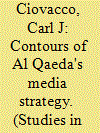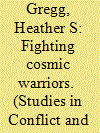| Srl | Item |
| 1 |
ID:
091438


|
|
|
|
|
| Publication |
2009.
|
| Summary/Abstract |
Al Qaeda has crafted a successful media strategy that is adeptly suited for the war of ideas against the United States. Osama bin Laden and Ayman al-Zawahiri have demonstrated a great ability to lead plural groups and exploit innovation with the use of technology. This article explores how they have connected with diverse audiences around the world with a constant message. The repetition of their platform themes and use of "message projection opportunities" demonstrate a great understanding of human nature, marketing strategy, global media, and world politics. In line with Prospect Theory, bin Laden and Zawahiri's messaging strategy emphasizes stemming losses over solidifying gains. Only through a better understanding of Al Qaeda's media strategy and all of its strengths, weaknesses, and idiosyncrasies can the United States truly recognize what it is up against and begin to construct an effective and comprehensive counter strategy.
|
|
|
|
|
|
|
|
|
|
|
|
|
|
|
|
| 2 |
ID:
087394


|
|
|
|
|
| Publication |
2009.
|
| Summary/Abstract |
This article argues that a successful strategy for fighting the Global War on Terror (GWOT) requires actions aimed not only at defeating the Al Qaeda network and denying its operatives sanctuary, but also efforts to delegitimize Al Qaeda's ideology; the United States has focused on the former at the expense of the latter. The GWOT requires a new strategy, one that continues to target Al Qaeda operatives and their assets, while undermining Al Qaeda's message. This requires a better understanding of Al Qaeda's ideology, how U.S. foreign policy may fuel that ideology, and a strategy for undermining militant Islam's worldview.
|
|
|
|
|
|
|
|
|
|
|
|
|
|
|
|
| 3 |
ID:
087388


|
|
|
|
|
| Publication |
2009.
|
| Summary/Abstract |
The defeat of Al Qaeda in Iraq may generate new threats associated with the dispersal of its fighters in the region and around the world. Veterans of earlier insurgencies and civil wars in Afghanistan, Bosnia, and Chechnya moved from one conflict zone to another, lending combatants valuable skills and networks of support. The flight of Iraq's irreconcilable insurgents is a greater threat to global security than the one posed by the Arab Afghans because of the range of combat experiences and skills acquired in Iraq since 2003. This manuscript revisits the history of Arab veterans of the anti-Soviet struggle in Afghanistan (1979-1989) to draw out lessons for countering the current bleed out from Iraq. It explores the diverse pathways taken by these "Arab Afghans" and the factors that facilitated different patterns of dispersal around the globe. The article concludes with broad strategic recommendations for counterterrorism measures.
|
|
|
|
|
|
|
|
|
|
|
|
|
|
|
|
| 4 |
ID:
087390


|
|
|
|
|
| Publication |
2009.
|
| Summary/Abstract |
Propaganda is at the heart of the struggle between Al Qaeda's strain of militant Islamism and the governments of the United States and United Kingdom. In an ideological struggle, propaganda is critical in shaping outcomes. Both Al Qaeda and the U.S. and U.K. governments recognize this, and have devised propaganda strategies to construct and disseminate messages for key audiences. This article considers the key elements in the Al Qaeda propaganda narrative, and the means through which it is disseminated. On the other side, it assesses the U.S. and U.K. governments' response, focusing particularly on the British effort to define and propagate a narrative centered on British values.
|
|
|
|
|
|
|
|
|
|
|
|
|
|
|
|